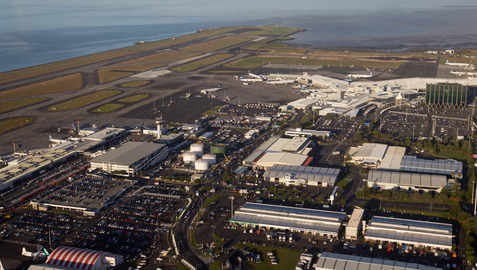 Auckland Airport's financial fortunes are closely aligned with that of the overall tourism industry and it spends around $10 million to $15 million annually supporting tourism marketing for the country.
Auckland Airport's financial fortunes are closely aligned with that of the overall tourism industry and it spends around $10 million to $15 million annually supporting tourism marketing for the country.
Auckland International Airport chief executive Adrian Littlewood said New Zealand still has plenty of capacity to grow tourism from its record levels achieved last year.
Visitor arrivals to New Zealand rose 10 percent to a record 3.13 million last year, and tourism has become the country's number one export earner, overtaking dairy which is in the doldrums. The sector has an aspirational goal of hitting $41 billion in total revenue by 2025, up from the $29.8 billion achieved in 2015.
Littlewood said while the goal is "quite a significant step up", it is achievable providing the industry works cohesively on growing the infrastructure to support that sort of rise in both volume and quality of international visitor who will stay longer and spend more. "We need to get it right."
Key opportunities identified in the 2025 tourism strategy are high value Chinese, international students, business events, cruise visits, emerging markets, and promoting Christchurch as a gateway and destination.
Auckland Airport's financial fortunes are closely aligned with that of the overall tourism industry and it spends around $10 million to $15 million annually supporting tourism marketing for the country while also lifting capital expenditure to deal with anticipated growth at the airport, the country's national gateway.
It signed a new memorandum of understanding in November with Tourism New Zealand to maximise the value of New Zealand's overseas visitor market, building on previous partnerships between the two. They'll focus on jointly identifying what's needed to boost visitor numbers from new and emerging markets and how best to invest resources.
Traditionally Auckland has been described as being at the bottom of the world but the world is round and Auckland is actually in the middle of a direct line between Tokyo and Buenos Aires.
Littlewood is critical the industry was too slow to respond to fast growth out of China and initially spent money in the wrong areas. In order to reach its target, New Zealand has to spread more visitors throughout the year rather than just in the peak summer months to ensure higher quality visitors enjoy the experience, he said.
Auckland Airport's own aspiration is to become a southern Asia-Pacific hub and Littlewood said it has taken a further step on that path with a stronger than expected period of expansion in air services. Six new airlines have commenced or announced services to Auckland in the past 12 months.
Achieving that desired hub status relies on a partnership with another international airline carrying a large population through Auckland onto South America or another destination, Littlewood said.
"Traditionally Auckland has been described as being at the bottom of the world but the world is round and Auckland is actually in the middle of a direct line between Tokyo and Buenos Aires."
Ireland, which is also a small country with 4.5 million people, has 8.6 million visitors a year and I don't think the people of Ireland feel those visitors are taking over the country.
A simple comparison against peer group countries suggests New Zealand still has capacity to grow, though it will require ongoing and close coordination between government and industry, he said. New Zealand is ranked number 67 in the world by visitation per capita and 107th by visitation per square kilometre.
"There are plenty of opportunities for this country but we will have to be receptive," Littlewood said. "Ireland, which is also a small country with 4.5 million people, has 8.6 million visitors a year and I don't think the people of Ireland feel those visitors are taking over the country."
Cheap fuel prices, more efficient modern aircraft, and a lower kiwi dollar are making long-haul flights to New Zealand more attractive to those people who have always wanted to visit here but thought it too expensive, he said.
In one example of where change is needed, Littlewood said there is no nationwide group view on hotel development. Providing detailed information on visitor forecasts to hotel developers would give them "a real handle before they put their money at risk," he said.
Improved visitor numbers have already led to commitments for a 20 percent increase or around 2,000 new hotel rooms in Auckland alone while the number of Airbnb properties in Auckland grew 260 percent, or 1,000 rooms, in the past year.
Auckland Airport has a 20 percent stake in the Novotel Hotel at the airport and 100 percent of the Ibis hotel. It's also just chosen a preferred partner, which it's yet to name, for a premium third hotel it will own with construction due to start later this year and will start planning next year for a fourth budget hotel.
Herald Monday, 22 February 2016
